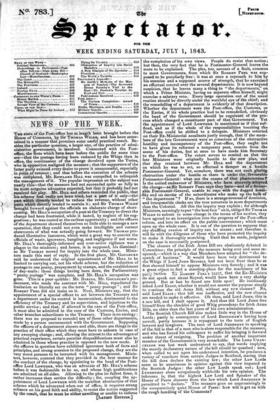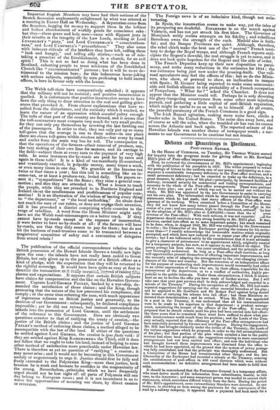NEWS OF THE WEEK.
THE state of the Post-office has at length been brought before the House of Commons, by Sir THOMAS Wusos, and has been enter- tained in a manner that promises some useful practical result. Be- sides the particular question, a larger one, of the practice of admi- nistrative government, is involved. Connected with the Post- office, the facts which have been before the public for some time are—that the postage having been reduced by the Whigs then in office, the continuance of the change devolved upon the Tories, who in opposition maligned the measure; that the supporters of the latter party evinced every desire to prove it unsuccessful, especially in point of revenue ; and that before the execution of the scheme was conipleted, Mr. ROWLAND HILL was compelled to relinquish the management of it. The popular impression on the subject was nearly this—that the measure had not succeeded quite so fully as its more sanguine advocates expected, but that it probably had not received fair play. Mr. Him. and others reminded the public, that his scheme had really not been tried, but a part of it only—the part %PAM' rdirectly tended to reduce the revenue, without other parts which directly tended to sustain it ; and Sir THOMAS WILDE brought forward against the officials an elaborate charge of short- coming. Mr.IIILL's occupation of a post at the Treasury to direct the change bad been frustrated, while it lasted, by neglect of his sug- gestions ; he was ousted at the earliest opportunity ; and the officers of the department showed themselves so little able to manage a new operation, that they could not even make intelligible and correct -statements of what was actually going forward. Sir THOMAS pro- duced illustrative instances, which went a great way to convict the officials of waste, ignorance, bungling, and negligence if not worse. Mr. IhLL's thoroughly-informed and ever-active vigilance was a plague to the misdoers ; and hence, it is supposed, his dismissal : so Sir THOMAS moved for inquiry into the whole case. Minis- ters made this sort of reply. In the first place, Mr. GOULBURN said he understood the original appointment of Mr. HILL to be limited to carrying out, not his whole scheme, but the reduction of postage to one penny, prepayment by stamps, and the establishment of day-mails: those things having been done, the Parliamentary "penny postage" was complete, and Mr. HILL'S occupation was gone. This is a poor quibble: Mr. BARING, Mr. GOULBURN'S pre- decessor, who made the contract with Mr. HILL, repudiated the limitation so literally set on the term " penny postage" ; and Sir ROBERT PEEL did not insist on it. Next, Ministers say, that the appointment of a special officer to act between the Treasury and a department under its control is inconvenient, detrimental to the efficiency of the Treasury and its supervision, and injurious to the public service ; and that, if allowed in the case of the Post-office, it must also be admitted in the case of the Customs, Excise, and other branches subordinate to the Treasury. There is no analogy : there was no proposal to remodel any of those other departments, made by a person unconnected with the Government. Supposing the officers of a department sincere and able, there are things in the practice of their office which they must have to unlearn in case of any sweeping change; and, allowing the utmost to the advantages of practical experience, certain peculiar disqualifications must also be admitted in those whose practice is opposed to the new mode. If the officers in question have exhibited ignorance both of facts and principles, and strong aversion to the proposed change, they are the very worst persons to be intrusted with its management. Minis- ters, however, contend that they provided in the best manner for the conduct of the change, by appointing to the head of the Post- office Lord LowniEs, who was an advocate of Mr. HILL'S scheme before it was fashionable to be so, and whose high qualifications are admitted on all sides. Allowing to the plea its fullest force, it rather increases than settles the difficulty ; for, coupling the ap- pointment of Lord LOWTHER with the manifest obstruction of that scheme which he advocated when out of office, it requires strong reliance on his good faith and ability, to resist the notion suggested by the result, that he Must be either unwilling or unable to enforce the completion of his own views. People do resist that notion ; but then, the very fact that he is Postmaster-General leaves the more to be explained. The plea, too, savours of a fault, common to most Governments, from which Sir ROBERT PEEL was sup- posed to be peculiarly free : it was at once a reproach to him by his enemies and a supposed source of strength, that he exercised an effectual control over the several departments. It is now beyond suspicion, that he leaves many a thing to "the departments," on which a Prime Minister, having no separate office himself, might exercise a salutary veto. Every large operation out of the usual routine should be directly under the watchful eye of the chief; and the remodelling of a department is evidently of that description. Whether the department were the Post-office, the Customs, or the Excise, if its whole practice had to be remodelled, obviously the head of the Government should be cognizant of the pro- cess which changed a constituent part of that Government. Yet the appointment of Lord Lowxlize is mentioned as if that suf- ficed, and as if the whole of the responsibilities touching the Post-office could be shifted to a delegate. Ministers retorted on their Ex-Ministerial assailants justly enough, that if the mem- bers of the late Governmentt were so conscious of the obstructive hostility and incompetency of the Post-office, they ought not to have given its reformer a temporary post, remote from the scene of his duties, but at once to have made him Secretary to the Post-office. The retort serves to remind us that the late Ministers were originally hostile to the new plan, and that they retained between Mr. Buz and the department on which he was to act, so effectual a damper as a hostile Postmaster-General. Yet, somehow, there was not such ...glen* obstruction under the hostile as there is under theAvaarable Postmaster-General : what are the Causes of that phatnometion Is the united endeavour of Ministers, who have sioceielsidepted the change-as Sir ROBERT PEEL says they have--4ad of allivour. able Postmaster-General, unable to cope with the dogged hosti- Aity and ais inertia of the subordinates who make up the bulk of " the department "? If so, there is a strange reversal of dominion, and irresponsible clerks are the true autocrats in more departments than the Colonial. All this the inquiry may explain ; for although Ministers, seemingly to put "the best face" on it, obliged Sir THOMAS WILDE to submit to some change in the terms of his motion, they have agreed to an investigation into the progress of the Post-office reform, and into its effect on the public convenience; which must open up the whole case. It is out of the question to suppose that any shuffling evasion of inquiry can be meant ; and therefore it will lie with the diligence of those who have promoted the inquiry to make it thoroughly searching. Until that be made, judgment on the case is necessarily postponed.
The clauses of the Irish Arms Bill are obstinately debated in Committee; the principle of the measure being ever and anon re- opened,—which is a way that Members have adopted for "the de- spatch of business." It would have been very detrimental to the Whigs if Lord JOHN RUSSELL had not been freer than he at first showed himself to oppose Ministers very fiercely ; and it was a great object to find a standing-place for the machinery of his OIj !actics. F,:r ROBERT PEEL'S ta'ant, that the Ex-Ministers do not speak out about Repeal, would have been a very shabby ground. But at last he found one little spot! He insidiously asked Lord ELIOT, whether it would not answer the purpose simply to continue the old Arms Bill, without any new clauses? No, said Lord ELIOT ; that bill was ineffective, and the new clauses are needed to make it effective. Oh then, said Lord Jour, this is a new bill, and I shali oppose it. And thus did Lord Jour free himself from the shackles of good Whig precedents for Irish Arms Bills, no older than the last years of his own administration. he Scottish Church Bill also makes little way in the House of Lords ; partly in consequence of Lord BROUGHAM'S having been unwell, partly because it is repugnant to the taste of English lawyers and lawgivers. The tone of Lord ABERDEEN if] speaking of the bill is that of a man who is alone responsible for the measure, and who has forced his colleagues to suffer his bringing it forward under threat of resigning. The position of another important member of the Government is very remarkable. The Loan CHAN- CELLOR was last week understood to say, that words implying the merely declaratory nature of the bill should be quashed : now, when called to act upon his understood intention, he produces a variety of vouchers from certain Judges in Scotland, stating that the bill does declare the existing law ; the other Law Lords seem to be unanimous in opinion against this view imputed to the Scottish Judges : the other Law Lords speak out ; Lord LYNDHURST alone scrupulously withholds his own opinion. The inference is, that the highest Law Lord and Speaker of the House of Peers dissents from the law which Lord ABERDEEN iS permitted to " declare." The measure goes on unpromisingly in the comparatively quiet House of Peers: how will it get on with the rough handling of the Commons? Impartial English Members may have had their notions of the Scotch Secession unpleasantly enlightened by what was uttered at a meeting in Exeter Hall on Wednesday. A deputation came front the Seceders, begging for money to support them in the loftiest and holiest abandonment of worldly goods for conscience sake : but they—these grave and holy men—came with flippant jests in their mouths at the integrity of the Law Lords, mocking at Lord LYNDHURST'S "piety," and Lord COTTENHAM'S "conscientious- ness," and Lord CAMPBELL'S "prayerfulness." They also came with indecent ridicule of the brethren they have left, calling them "lank and hungry," and telling silly stories,—such as of mis- taking a preacher of the Establishment, in a church, for an evil spirit ! This is not so bad as doing what has been done in Scotland, exhorting people to treat ministers of the Established Church like "excommunicated" persons ; but it will be more de- trimental to the mission here ; for this indecorous horse-joking with serious subjects, especially by men professing to hold sacred offices, is here in favour only with the lowest.



























